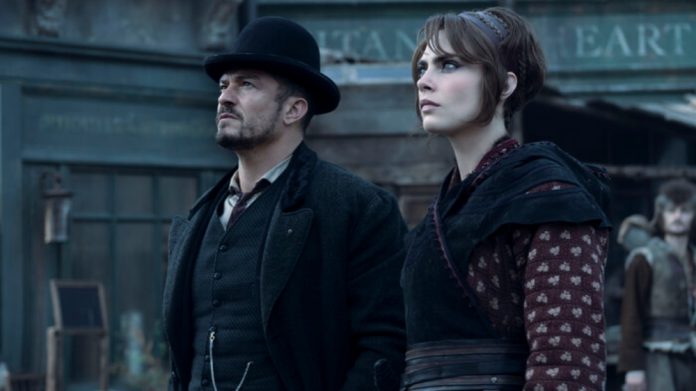They say all good things must come to an end, and that couldn’t be truer in the streaming world of television. Just ask Erik Oleson (Marvel’s Daredevil), the executive producer and showrunner of Carnival Row, who joined the show for Season 2, only to see it canceled due to circumstances beyond his control.
Oleson has history with Amazon — he was the head writer and executive producer for Season 2 of The Man in the High Castle — and he just launched the production company Crime Think, which will be based at the streamer, where he’s currently under an exclusive three-year overall deal. Crime Think aims to give a leg up to non-Hollywood types who have interesting stories to tell and want to learn the business of showrunning. As for Carnival Row, Olesen understood why Amazon pulled the plug on the mythological fantasy series when it did, i.e. in the middle of Covid.
Season 2 of Carnival Row finds humans and creatures clashing once again, as human detective Rycroft Philostrate (Orlando Bloom) and faerie Vignette Stonemoss (Cara Delevingne) are still entangled in their Romeo and Juliet-esque love affair while he investigates a series of gruesome murders and avoids the wrath of the local police and government, whom he has angered with his support of The Burgue’s human leaders and their unjust oppression of the fae.
Above the Line recently spoke with Erik Oleson via Zoom, where he reminisced about his humble beginnings as a 12-year-old set mascot on Broadcast News and as a script reader in Hollywood, where his job was to “strongly consider” possible options for his bosses at Amblin Entertainment. Oleson described how he gravitated toward the fantasy genre and took over showrunner duties for Season 2 of Carnival Row, before assuring me that the series will have a satisfying ending. Oleson revealed he even received an exit blessing from Amazon’s head honcho Jeff Bezos for the series to conclude with a truly epic finale.
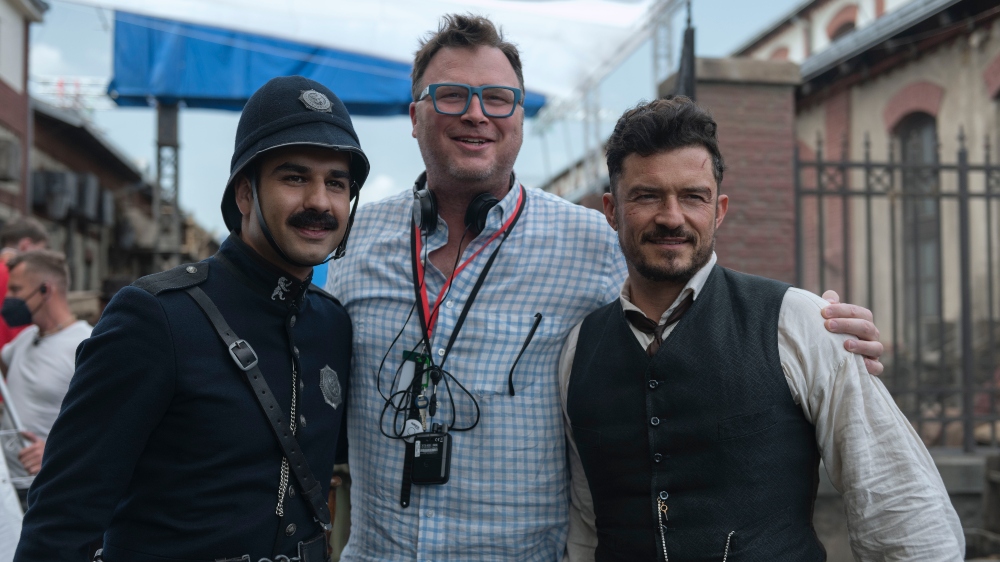
Above the Line: Here you are in this fantasy genre, which is really your baby. Tell me the strengths that you bring as a showrunner, having that kind of background.
Erik Oleson: I inherited the show in Season 2. It was created by Travis [Beacham], and I picked up the threads that he’d started. I feel like the strength that I bring as a showrunner is that I’m highly organized. I’m a planner and highly collaborative. Some people who do the showrunner job are combative and not the most pleasant folks. I’ve worked for some of those folks. I have a different mentality. I take a certain leader’s approach. I feel like shows are at their best when I look at myself as almost like the P.A., making sure that everybody is getting what he or she needs to do their best work, and then hiring people who are far more talented and far smarter than I am to do their craft to the best of their ability while making sure that they have the resources. And as the boss, I’m in a position to steer where those resources go. I just want to make sure that everybody gets their chance to do their best work. And very often, that means having a script on time that’s in good shape so that the costume designer isn’t scrambling or the prop master isn’t missing his daughter’s wedding because he’s got to scramble for props the night before production. It goes on and on like that through the entire chain of production, post-production, and all of that.
I think that I also put in a lot of effort to reach consensus with the executives, like in the genesis phase of scripts and stories. I go back to “why are we telling this story? What’s the point?” You know, when you’re working with a crew of 1,500 people plus executives, there’s going to be a lot of ideas. That controlling idea becomes the prism through which you judge all other things. It becomes, quote-unquote, “the vision of the show,” so that there’s a reason to evaluate what might otherwise be a brilliant idea for another show but has nothing to do with the show and the story that you decided to make at the start. So I spent a lot of time making sure that everybody understood why we were telling a story.
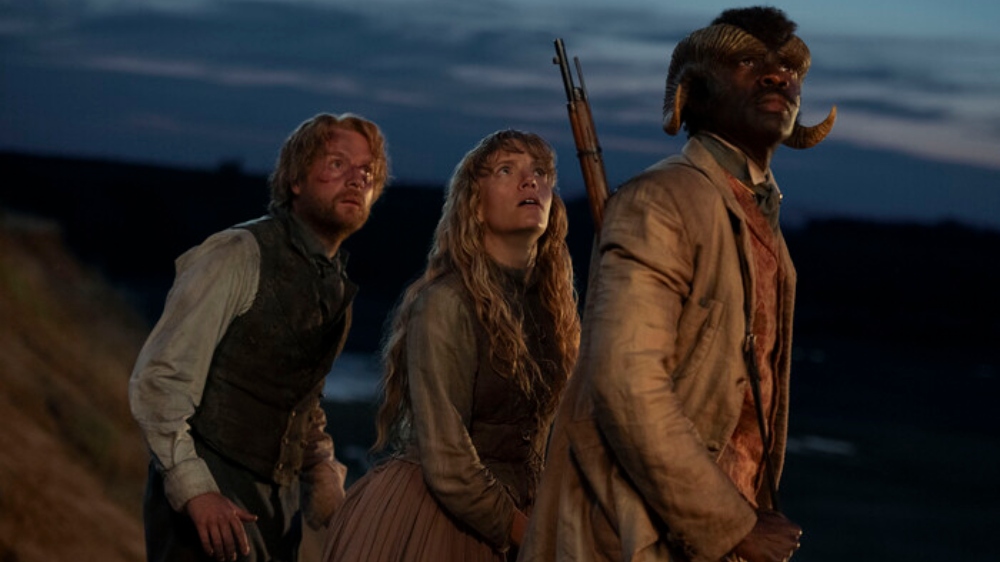
ATL: So how did your involvement with Season 2 come about?
Oleson: I was actually called about season one, but I was under contract at Marvel, and Marvel wouldn’t let me go play in the fun fantasy world of Carnival Row. They had told me that I was going to be doing Season 4 of Daredevil. Of course, that all fell apart when Netflix and Marvel split up. I went over to Amazon, and Amazon invited me to get a second bite at it and take over Season 2. The team from Season 1 had departed, and they said, ‘What would you do with this world?” And go have fun.’ So I did.
ATL: What sort of nuances were you going to bring to it that were different?
Oleson: I have a different process than some writers; some showrunners are what I call “pantsers,” which is somebody who makes up storylines as he goes, right? The story is revealed as you write it, kind of in a linear order, and then maybe you get to the end and you go back to your revision, etc. I am the opposite. I’m a planner. I ask questions from the beginning of the process. “Why are we telling this story? What’s the point of spending tens of millions of dollars and asking actors and crew to pour their hearts and souls into creating a world and a storyline?” Writers like myself want to make sure there’s a reason for it all. I start with a controlling idea, such as a central theme that I really want to investigate. And so when I came to Amazon and Legendary [Television], I wrote down an idea on a piece of paper, and I said, ‘Will you agree that I can tell this story?’ And Amazon said ‘yes,’ and then the Legendary executive said ‘yes.’ I said, ‘Okay, then I now know what the show is.’
ATL: How would you describe getting to the central theme?
Oleson: That was a question. Are we defined by our DNA, or are we defined by our choices in life — by our actions and the way we treat others — because we were all living in a time when the world appeared to be very divided. Everyone was acting in tribalistic little groups, which really freaked me out and bummed me out, and I wanted to say something positive that posed the question, “What is the best way to push back against social injustice?” Is it to try to work the system from within and slowly, incrementally change it to bend the arc towards justice, or is it to take it to the streets? Is it to take up arms?
And those are the questions that are happening in Ukraine right now, or in Brazil right now, or in the United States right now. I mean, basically, throw a dart at a map, and somewhere those kinds of questions are playing. And, to be honest, those questions are historically just a cycle that occurs all the time in the human condition. So I start from that place. I start from the question [of], “Can we say something meaningful with the show?” And if the answer to that is “yes,” then I’ll jump into a big fantasy world or become a Marvel superhero, and I’ll know what I’m doing.
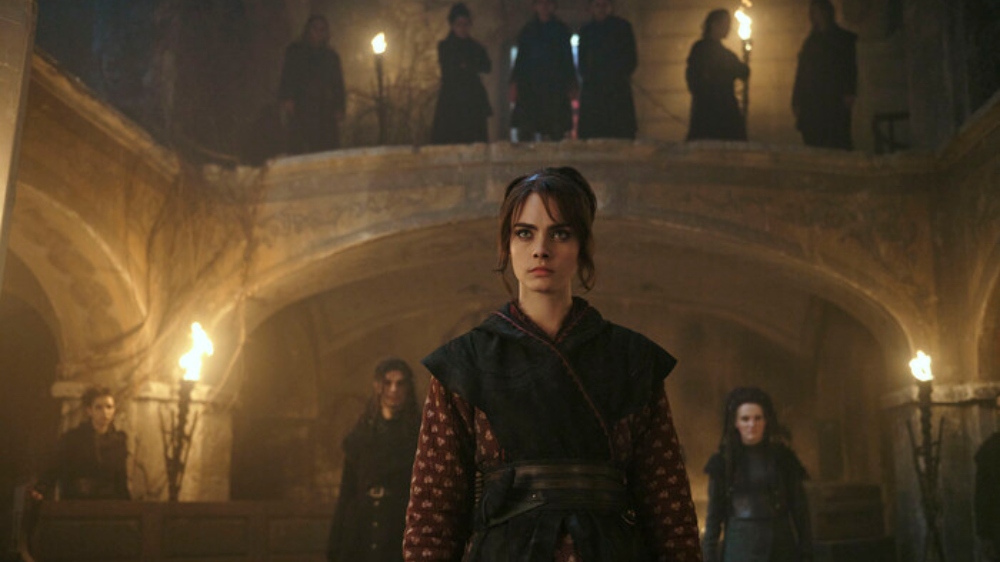
ATL: How would you describe your process in getting the story told as the showrunner?
Oleson: Part of my favorite process is being very open with all of the collaborators who make the show, whether it’s a producing director or a costume designer or a set designer, so that they know the progression of the story and they can then go do what they do best. I’m making this up right now, but the green costume, for instance, maybe it’s very saturated and very green at the beginning of the story, but as the world gets more gray and morally ambiguous, maybe it’s the same costume, but the costume becomes a little bit less vibrantly green. It becomes desaturated and a little more gray. So you can subtextually tell stories with visual elements on the screen that are invisible but subconsciously delivered to the audience.
ATL: Can you give me an example of where you had to give your own input into a specific department?
Oleson: Everything is presented to me as showrunner, whether it’s a creature design, a costume, or a script that I originally broke out but a writer sent back to me. I have input on every edit. “Where does that edit fall?” “Does the creature come from the rafter in the ceiling?” All of those calls kind of come back to the showrunner. I have input on all of them. But again, what I want to do is set up people who are smarter and more talented than I am to succeed at their jobs and let them come back and say, ‘Hey, I think we should do it this way, Erik.’ Generally speaking, my job is to say, ‘That’s way better than what I would’ve come up with. We’re doing it your way.’ My input was like, ‘This is awesome. I can’t believe I get to work here.’ That was my input. And then we just did what the talented artists had suggested.
ATL: When you joined Carnival Row, you obviously could never have predicted that a pandemic would stall the second season, or that Orlando Bloom would become a dad. Talk about how that affected Season 2.
Oleson: Well, Daisy’s birth was a delight! COVID was not a delight! In one extreme, it was like a wonderful thing that happened, and the other thing was at the end of the world, but literally, we all thought, “Well, what does it matter? None of us are going to get through this anyway, so who cares about a TV show, right?” We were all in that place. It was a challenge. We were almost finished filming Season 2. We were in the last block. We were filming Episodes 7 and 8 of what would’ve been an ongoing series.
As COVID hit, we had to shut down production for a year in the middle of it. During that year’s hiatus, Amazon made the correct call that it was just going to be unfair to the cast and crew to hold them to contracts forever without being able to go get other jobs and make a living. So they did the honorable thing by letting people say, ‘Okay, you can go get other work.’ You know, people had to eat and the world was ending, so I was supportive of that. What Amazon, I, and Legendary decided to do was end the show with Season 2.
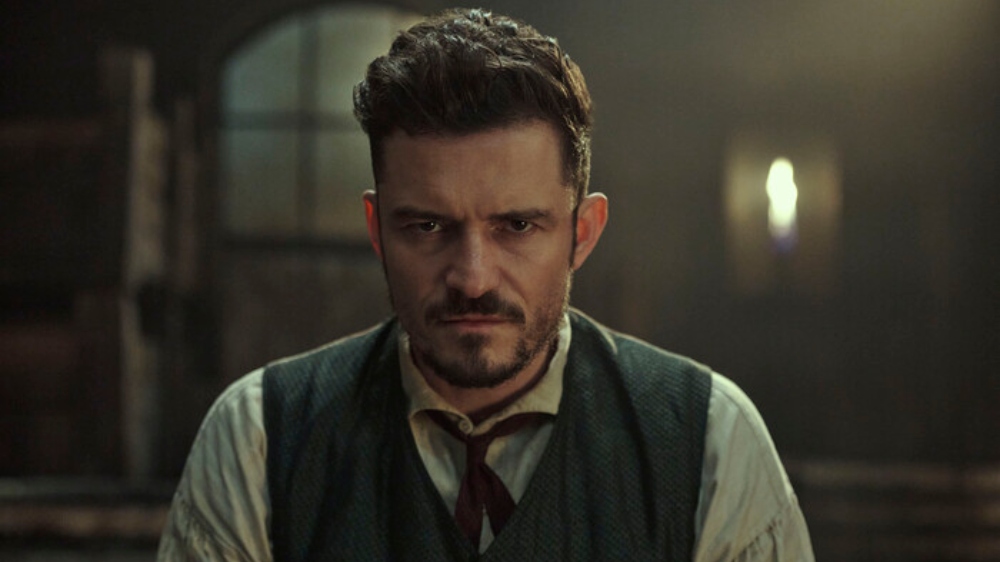
ATL: How did you fine-tune the show so it would end organically?
Oleson: So they gave us a couple extra episodes, and then we went back and retooled some of the storylines that had set up the hooks for [in] future seasons. We just cut that part out and replaced it with stuff that was going to instead weave Season 2 into a really satisfying — you’ll see it — [and] hopefully epic conclusion to the adventure, so that now viewers can say, “Oh, I never saw Carnival Row.” “How long do I really want to join it?” Oh, it’s an 18-hour commitment, but you’ll have this ever-growing show. It gets bigger and deeper and cooler, and then it ends with a real bang. It almost becomes like a limited, but an 18-hour limited series.
ATL: You know, not every showrunner has that luxury when somebody pulls the plug on them. So, good for you.
Oleson: Good for Amazon, honestly. They said they wanted to do it the right way, and that came from the top. I’m probably going to get in trouble for saying this, but Jeff Bezos himself said he wanted it to be done right, and that filtered down to us, and we got the resources that we needed to complete the show in the way that it needed to be completed. We really got everything we asked for, and I think the fans are going to see the proof of that on the screen.
ATL: What is your next collaboration with Amazon?
Oleson: I launched a company called Crime Think, as in Orwellian thought crimes. We have a number of projects in development at Amazon. I’m very interested in mentoring voices that have not made it to the screen yet, so I’m working on some projects with folks who don’t yet know how to run a show but come from some very interesting backgrounds. One of the projects I’m working on right now involves a woman who was a slave in Kuwait in real life. She was the child of migrant laborers, had no legal rights, and worked as a slave. I’m very interested in a story that I’m working on with her and teaching her the ropes to do what I do. I’m having a great time working with these crazy Amazon fools, and I can’t wait to make some more television with them.
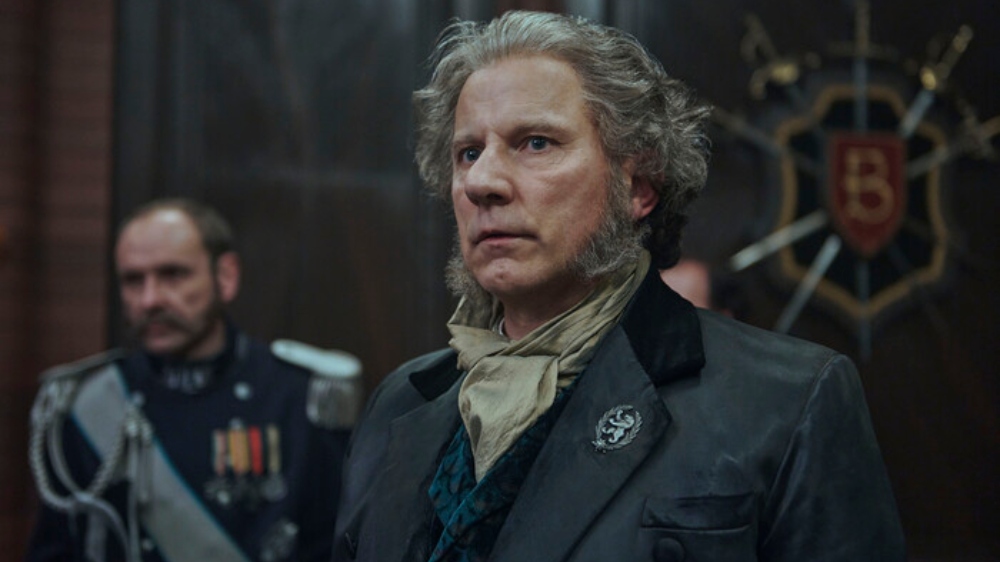
ATL: One of your first jobs in Hollywood was as a reader. What did you bring to them that came to fruition?
Oleson: I mean, that wasn’t the beginning, but yes, I was a reader for (Amblin Entertainment) Kathleen Kennedy, Jeffrey Katzenberg. Frank Marshall, Chris Columbus, and Steven Spielberg back in my assistant days. I don’t think I want to take credit for it coming to fruition because I brought it to them. I was one of the readers who read a short script called The Sixth Sense and gave it “strong consideration,” if I recall correctly. When you’re a Hollywood reader and you hear “recommend,” you know that’s a dangerous thing, but “strongly consider” is, like, the best thing that you want to tell your bosses, because “recommend” basically means that if they read the script and they’re like, ‘This is crap, you’re fired.’ Instead, I strongly recommend it!
ATL: Does M. Night Shyamalan know that you gave his script a “strong consider?”
Oleson: You know what? I’ve never met the man. We almost worked together on something, but yes, that’s the power of why you’re nice to the people who are 20-somethings trying to break into the industry. Because they might just be the ones who decide whether or not you get the script on the desk of the boss.
ATL: Going back to the beginning, your first big break was as a set mascot? Describe that to me.
Oleson: I was actually on a school bus to middle school when they were filming Broadcast News in my hometown of Clifton, Virginia. When I got to school, I pretended to be sick, got my mom to pick me up from school, and on the way home in the car, I said, ‘Just kidding. I’m not sick. They’re filming a movie in our hometown, and will you please drop me off on the set?’ She was mad, but she got over it. They were actually wrapped during the day; I’d missed the scene, but the assistant property master was picking up the director’s chairs and putting them into the back of the props truck. I picked one up and I followed him, and he was like, ‘Who the hell are you?’ And I said, ‘My name is Erik Oleson, and I want to be in the movie business more than anything.’ I was 12, if I recall, but I was very tall. I’m 6′ 8.”
Basically, he gave me his card, and his name is Randy Gunter. He still works today, but basically, he would tip me off to where they were filming and I would just show up, and eventually they gave me a walkie-talkie and they let me be a non-paid production assistant. It was the first chance I ever got to hang out on a movie set. I remember at one point my parents came to downtown Washington, DC, to pick me up, and I was standing in the middle of Constitution Avenue, holding up traffic like a cop, and I was this 12-year-old production assistant. My parents joined me for crew lunch, and (writer-director) Jim Brooks had, at the time, one of the best catering companies in Hollywood, so crew lunch was beef Wellington and lobster tails. And I just said, ‘Mom and Dad, I’m working in the movie business for the rest of my life!’ So at age 12, that’s what I knew I was going to do for the rest of my life.
Season 2 of Carnival Row has begun streaming on Amazon Prime Video.


